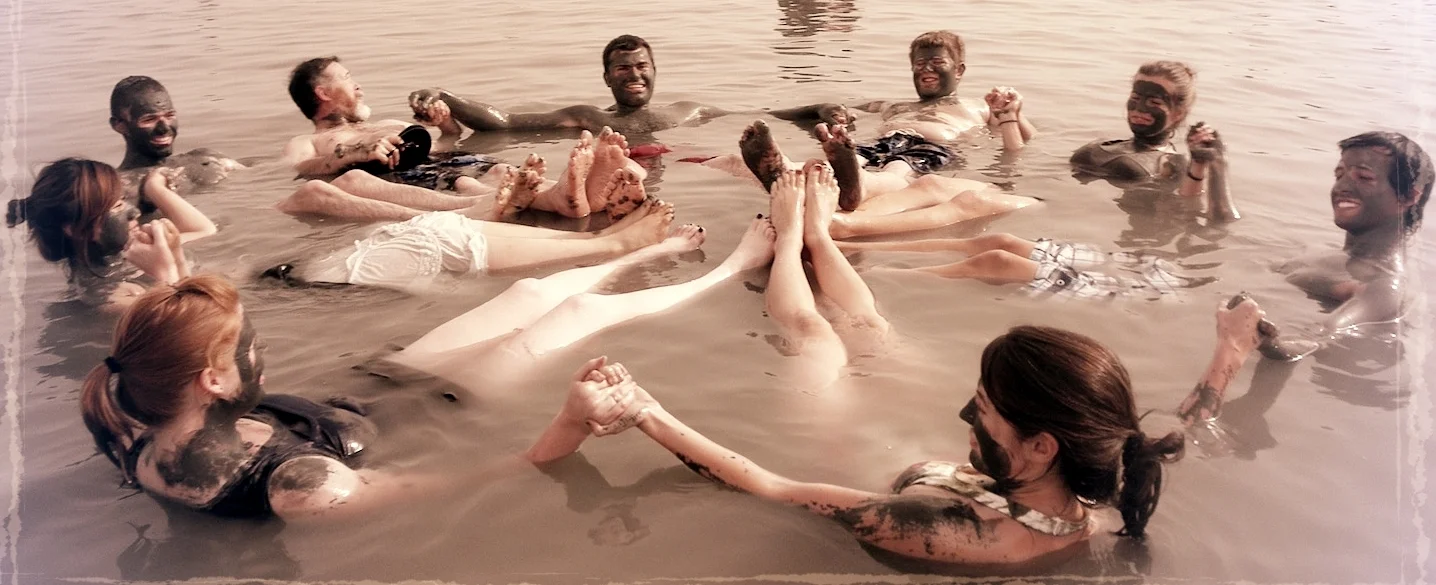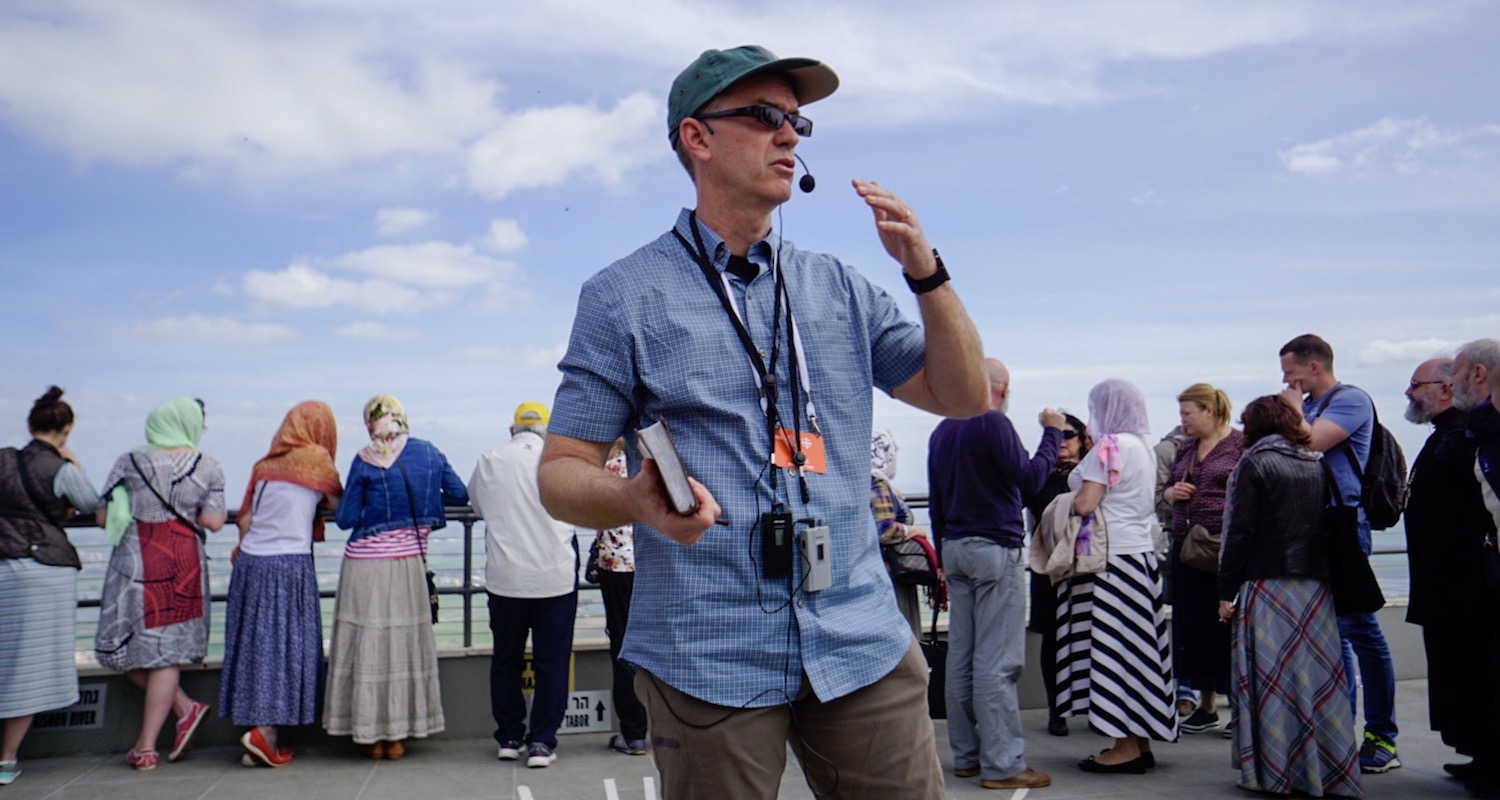Thanks to Ron Vance who captured this image of students experiencing the wonder of the Dead Sea. Ron was a part of the 2010 Cincinnati Christian University Study-Tour to Israel-Palestine.
The Study-Tour
Who is a student? Who is not a student?
The academy cannot become a bakery because students are not butterscotch cookies. They are wondrously human: capturing, sorting, and applying information from the world about them in ways that are unique and personal (and sometimes challenging!). Some lessons stick, others are forgotten (or simply ignored). Maybe this is also a part of what it means to be human and we should stop fussing and simply accept it. Or perhaps--dare for a moment to dream with me--could it be that sticky lessons stick precisely because they are concocted at the right time in the company of the right people and presented in the right way that aligns with the student's own learning style?
A perfect (educational) storm. A teacher's dream.
This is why the study-tour can be so valuable.
Study abroad removes a student from the familiar and inserts her/him into a "strange" place where fresh negotiations are required. This shift is exhilarating and terrifying and mysterious and marvelous all at the same time. I've seen it punch holes through mental walls. Contemporary research also bears this out.* The study-tour repeatedly places unexpected opportunities in the face of the learner. The mental ladder is climbed one rung at a time: experiencing, reflecting, thinking, acting.** Some of this happens by design; some of it just happens.
The tactile experience of walking across the Delphic Stadium by Tony Bivins and Jessica Rappe cannot be duplicated in the traditional classroom! Tony and Jessica were students at Boise Bible College when Mike Kennedy snapped this photo. Thanks to Mike for sharing this and other images from our Aegean Study-Tour, 2003.
So what could possibly up this already-good-game? Lacing intellectual moves together with spiritual dynamics. When it comes to pondering the roots of Western civilization, a study-tour in the Mediterranean arena offers rich learning opportunities for students and faculty alike. However, when it comes to pondering the roots and meaning of the biblical story, it is difficult to imagine a more powerful opportunity than a study-tour in Israel-Palestine. The reason is obvious. It is one thing to study through Jesus's Sermon on the Mount. It is another thing to do it while sitting in the grass with the the waves of the Sea of Galilee lapping in the background. This is life-changing, value slapping stuff.
Recognize that our study-tours are fast-paced and will challenge head, heart, and legs. It is not unusual to walk ten or twelve miles in one day, traveling up and down steps and over uneven terrain. Recognize also that every attempt is made to place these trips within financial reach of the student. This means that accommodations, while secure, will not be the most comfortable. Private rooms might not be available. Food choices may be limited. We might even sleep in a bedouin tent on the desert floor! Embrace the inconveniences. They add to the adventure.
Professor Jody Owens of Johnson University presents details from the biblical book of Kings. He stands on the roof of a structure built to commemorates the contest between Elijah and the prophets of Baal. Photograph by Bible Land Explorer Adrienne Griffin.
I often hear feedback from former travel mates. They may be college- or seminary-level students, pastors, teachers, or serious laypersons. They tell me how much fun they had overseas and how their study-tour changed them and how they will never read the Bible in the same way again. It makes me smile. Somehow, a personal engagement with cultural, literary, geographical, and archaeological realities has raised the bar. Our mantra, "Observe--Engage--Contemplate," has resonated with them in a way that study in the classroom did not. Or could not. Ahhh! Could it be that perfect (educational) storm again?
If raising this bar is of interest to you, keep reading through this website. If you are a faculty member or college administrator, I am keen to hear from you. Know that together we can craft a program that meets the needs of your student, aligns with your accrediting standards and goals, and gives your faculty not just another development opportunity, but a significant role to play in the process. We already service several colleges and universities.
Let’s make learning fun again.
Sharing teaching responsibilities with faculty leaders is a priority of our study-tours. Here, Professor Dan Dyke of the Cincinnati Christian University works through a passage from the book of Judges while standing on the summit of Mt Tabor, Israel. Thanks to Wendy Wagoner, member of a 2008 Study-Tour to Israel-Palestine, for this photo.
*See J.T. Young, R. Natrajan-Tyagi, and J.J. Platt, Identity in Flux: Negotiating Identity while Studying Abroad. Journal of Experiential Education 38/2 (2015): 175-188.
**A.Y. Kolb and D. A. Kolb, Learning Styles and Learning Spaces: Enhancing Experiential Learning in Higher Education. Academy of Management Learning and Education 4 (2005): 193-212.

